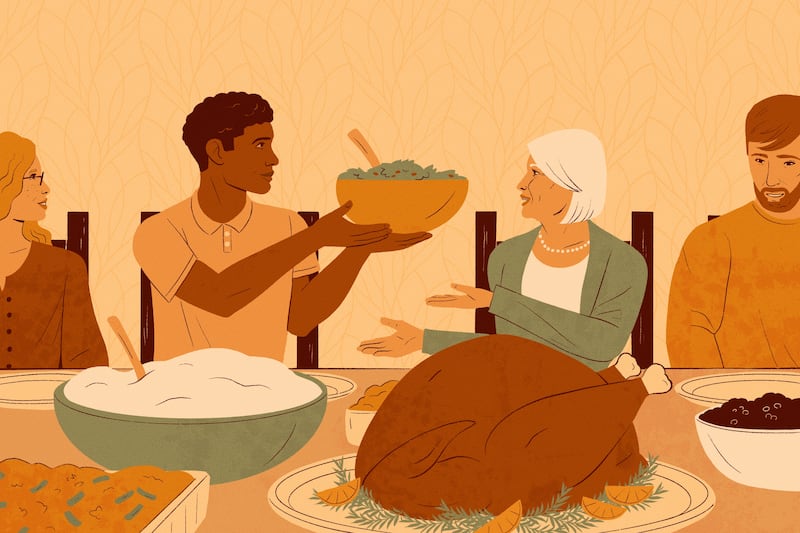Five days after the tragic assassination of President John F. Kennedy (which happened near Thanksgiving in 1963), Texas Gov. John Connally, who was also shot, was asked by a reporter if he had any reflections to share.
The answer, given as Connally lay in a hospital bed, sounded like something straight out of 2025.
Connally said he hoped the assassination would shock and stun the nation enough to make people aware of the “cancerous growth” of a society “that breeds a hatred, a bigotry, an intolerance, an indifference, a lawlessness …
“(The assassination) is nothing more than a manifestation of an extremism on both sides that basically is the genesis of our self-destruction, if we are ever going to be destroyed.”
It is disappointing and perhaps even shocking to see how little progress has been made in the intervening 62 years. The nation still is plagued by partisan hatreds and political assassinations.
The power of Thanksgiving
And yet, a good part of the answer to this “cancerous growth” is, and always has been, rooted in the Thanksgiving holiday.
A spirit of gratitude can change a person, helping him or her to see circumstances and people in a different, more positive and promising light. It can magnify a person’s sense of reliance upon a benevolent higher power. The more one cultivates this attitude, the more one feels grateful for even small things that become magnified as valuable amenities to an abundant life.
Those aren’t just flowery thoughts; they are rooted in science.
The Thrive Initiative, a collaboration between the military and the Clearinghouse for Military Family Readiness at Penn State, says on its website:
“Gratitude is more than a fleeting emotion or a polite response; it can be a mindset — a way of appreciating the world and recognizing the abundance surrounding us, even in challenging times.”
It cites research showing how a conscious effort to express gratitude “can potentially rewire our brains and help foster a positive outlook on life. This concept is called neuroplasticity — the brain’s ability to reorganize itself and form new neural connections throughout life.”
Over time, this can provide “a heightened sense of happiness and contentment and a greater capacity to cope with stress and adversity.”
A study
Harvard University’s medical school takes it farther. In a piece published last year, Maureen Salamon, Executive Editor of Harvard Women’s Health Watch, referenced a long-term Nurses’ Health Study that showed grateful people tend to live longer.
The study examined 49,275 women who were on average 79 years old. In 2016, participants were asked to rank how much they agreed with statements such as “I have so much in life to be thankful for” and “If I had to list everything I felt grateful for, it would be a very long list.”
After four years, researchers examined the participants’ medical records and found that 4,608 of them had died from a wide variety of causes. They found that those who originally recorded gratitude scores in the highest third had a 9% lower chance of dying than those who scored in the bottom third. Researchers controlled the results for factors such as “physical health, economic circumstances, and other aspects of mental health and well-being,” and found no change in the results.
“Gratitude seemed to help protect participants from every cause of death studied — including cardiovascular disease,” Salamon wrote.
Tyler VanderWeele, a co-author of the study, said, “What’s remarkable about gratitude is that just about anyone can practice it. Anyone can recognize what’s around them and express thanks to others for what’s good in their life.”
The Mayo Clinic’s website lists the demonstrable effects of consistent gratitude as improvements in sleep, mood and immunity as well as a decrease in depression, anxiety, chronic pain and disease risks.
‘If a pill could do this’
Then it adds this nugget: “If a pill could do this, everyone would be taking it.”
To many devout people, none of this comes as a surprise. Gratitude is a central tenet in many religious traditions. The origins and evolution of the Thanksgiving holiday are rooted in those traditions.
From his hospital bed all those years ago, the former Texas governor said, “I am not the least fearful of any foreign enemy so long as we have within ourselves not hate, but human understanding, not passion and prejudice, but reason and tolerance, and not ignorance, but knowledge and the willingness to use that knowledge.”
It’s worth pondering today, between bites of a bounteous feast, how each person has the power to make this happen by making every day an opportunity to express sincere gratitude, an attribute that will spread to others more powerfully than hate and anger can on the other end of the scale.


